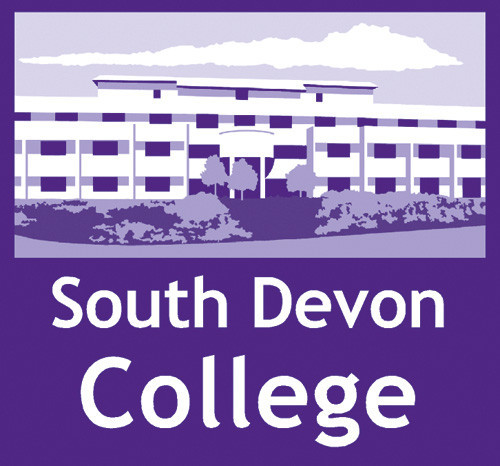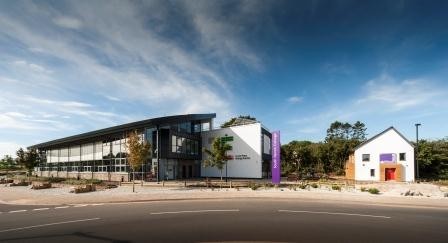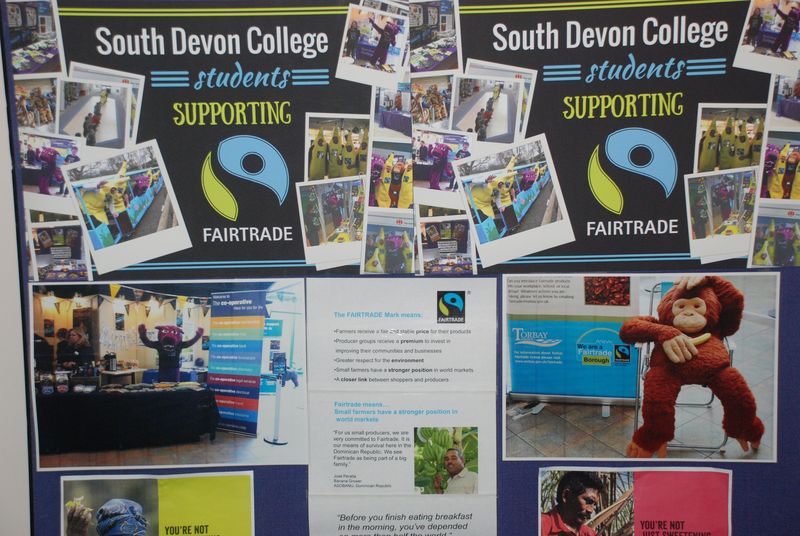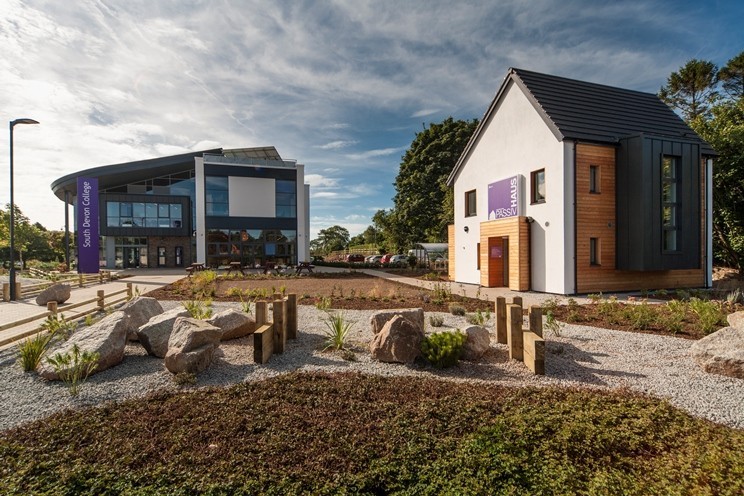South Devon College
Forever Green!
It is our intention that sustainability and energy economy become the 'norm' over the next decade and are fully embedded in all we do and all we teach.
South Devon College has fully embraced the Sustainable and Renewable Energy agenda, implementing a number of sustainable development solutions with the key aim of meeting local, regional and national drivers.
The College has adopted a cross curriculum approach to partnering with local businesses and development agencies and in supporting economic growth through innovation and entrepreneurship. It has recognised the Local Enterprise Partnership's priorities with 'Smart Specialisation' (See note #1) and has developed STEM (See note #2) Skills with a focus on higher skills development and retention.
In developing this sustainable approach key themes have included;
• Knowing local employers and community whilst increasing partnerships.
• Developing a short, medium and long term plan of education and support.
• Identifying the skills need, aligning courses with industry and community needs.
• Closing the gap between the competencies sought by industry and the learning focus.
• Retaining home grown talent.
• Influencing skills from early years.
• Developing transferable skills.
Whilst developing the future curriculum and maintaining a responsive approach to the rapid technological change that is sweeping through the sector, South Devon College has engaged in a number of Sustainable initiatives:
Sustainability in the Curriculum
Curriculums across the College are developed with Sustainability, Renewable Energy and Low Carbon Technologies referenced at every opportunity. The College provides a streamlined approach to learning, which is done via the following:
• A dedicated qualification pathway for South Devon High School [14-16 year olds] runs alongside core GCSE’s, allowing learners to explore Eco Technologies.
• A Specific Environmental Technologies curriculum that incorporates a Level 3 Diploma in Construction and the Built Environment is available for learners over the age of 16.
• The Foundation Degree in Sustainable Construction and the Built Environment provides the opportunity to study all the way through to Higher Education.
• The development of a specialist Renewable Technologies apprenticeship pathway.
• Themed week tutorials such as ‘Go Green’.
• Master classes and talks from industry specialists.
• Fair Trade events.
South West Energy Centre
Launched in September 2013, the South West Energy Centre is the catalyst for rapid growth in the green sector throughout the local area and beyond. The Centre is a high profile, inspirational skills and business development institution that is helping shape the future of the South West.
Working in partnership with multinational organisations, the Centre offers a range of invaluable services. These include helping businesses diversify into environmental areas, developing and identifying new markets for energy related technologies and facilitating businesses to save energy whilst cutting costs.
One of the main focuses of the Centre is to train and develop the skilled workforce that green technologies necessitate. With renewable technologies set to grow exponentially in the next decade, many businesses are keen to employ staff with essential skills in installing, maintaining and supplying energy saving solutions.
The Centre features a biomass boiler, thermal cooling, solar photovoltaic (PV) and solar thermal panels, amongst various other low energy systems, all of which are expected to play an essential role in reducing this country’s energy consumption and emissions.
By working closely with local and national businesses, the South West Energy Centre is helping develop excellent employment pathways for early adopters of green technology skills. The Centre’s leading initiatives have also contributed to it achieving an Excellent rating in the BREEAM benchmark scheme for sustainable builds.
Passivhaus Project
Passivhaus is an innovative structure designed to showcase revolutionary building solutions and sustainable building techniques. The core focus of the Passivhaus standard is to dramatically reduce the requirement for space heating and cooling, whilst also creating excellent indoor air quality and comfort levels.
The Passivhaus is an authentic design offering cost effective solutions that could be resided in. The building showcases low carbon hi-tech sustainable building techniques and systems, whilst offering a community hub to demonstrate and promote sustainable living.
Learners have the opportunity to access the Passivhaus using it as functional space for group work or investigation/research. The Passivhaus provides an effective, realistic environment to undertake research, testing and monitoring of the building's performance under varying conditions. The building's performance can be captured and monitored via data logging, which is accessed remotely from within the South West Energy Centre building or online.
Eat Learn Live
The Catering Services team are a vital ingredient in the overall success of South Devon College. The team work closely with the curriculum and support teams to ensure that the catering on offer is exactly what customers want and essentially need.
Catering Services provide an extensive range of outlets across the South Devon College campus, serving in excess of 3000 customers on a daily basis. Catering representatives sit on the College health and wellbeing group and liaise with the Active Wellbeing Coordinator, providing feedback and advice on menu contents to ensure that they contain the correct nutritional balance. The Team were also finalists at the Green Gown Awards 2014, recognising the hard work and commitment towards healthy and sustainable catering at the College.
Engaging with South Devon College learners is key and during a recent event, "Be Healthy Week", over 2000 pieces of fruit were given away, providing samples of both exotic and every day fruit in its raw state to show that not all fruits come from tins! (An example being pineapple).
The College also recently supported candidates taking their Maths and English GCSE's with an exams breakfast for £1, which proved very popular. This was available for an early period on the day of the exam, encouraging learners to allow enough time to ensure they were prepared and fully nourished.
The College is fully accredited for Fairtrade and sit on a local Fairtrade steering committee, being the "employer flagship" for Torbay. The Catering Services team use a multitude of Fairtrade products and organise and host numerous Fairtrade events throughout the year, including a "Pepsi" challenge with learners using Ubuntu Cola, which was the UK's first Fairtrade cola.
The College uses local suppliers who are encouraged to come into the College to do taste testing with the learners and provide them with information about the food. A good example of this was last Christmas when a supplier was 'talking Turkey' with a group of learners!
It is proven that nutrition gained from the catering services at South Devon College has had a direct influence on behaviour and performance of learners and has enhanced results. Due to the type of meals the College provides, healthy eating habits are promoted and in turn, social and life skills are enhanced. Eating these meals ensures that learners are hydrated and focussed which assists in their learning process.
Carbon Reduction Initiatives
Our key objectives support a sustainable approach in all that we do and this supports our strategic aims and college mission. We don’t play lip service to carbon reduction but lead the way by embedding the reduction of our carbon footprint in everything we do to save money and importantly prepare for new and existing climate change legislation.
The aim of our multi award winning South West Energy Centre is to give advice to individuals and businesses to reduce energy usage and help them diversify into environmental areas, working with industry to develop new energy related technologies and find new markets.
Our University Centre building incorporates rainwater recycling, solar panels and exposed concrete soffits to allow free cooling with night cooling, augmented by automatic opening vents, all leading to the achievement of a BREEAM ‘Excellent’ rating. Our main campus building uses photo-voltaics, light sensors, rainwater harvesting and building management systems.
We have also been closely involved in the construction of a low carbon footprint structure at a high profile local organic farm, using straw bales set on recycled car tyres filled with crushed stone. The timber used was sourced locally from woodlands in Devon.
We have 100% ‘zero to landfill’ recycling programme in place and working successfully. The College has a dedicated area offering stationery for re-use and we recycle all unwanted books and 95% of the paper we have finished using hitting targets of 10% reduction year on year.
We have worked with key transport providers ‘Stagecoach’ and ‘First Great Western’ to extend their existing services to support an area wide network, providing green transport to our campuses with a 3-fold increase in usage over recent years. We have a car share scheme and cycle-to-work scheme for staff and our Groundwork team have used bio-diesel powered vehicles for years. We are also identifying opportunities to migrate our vehicle fleet to eco-friendly lean burn engines when these arise.
Our Information Technology initiatives include server virtualisation, the upgrading to low energy PCs and adopting power saving software. We have championed print management solutions to reduce the need to print and reduce associated paper usage. Our internal communications are through our wi-fi, website and using social media, with course applications handled online. Training for staff is provided on-line and we use Netbooks, E-portfolios, ‘Moodle’ VLE to replace paper based student to tutor communications and LEAP EILP to personalise student’s learning, targets and assessments; and our classroom protocols remove the need for printed literature and reference paperwork. We have developed ‘Learning Zones’ that enable more students to access computer based technologies more easily and frequently.
Our curriculum too has developed on-line and blended learning for students to reduce the need to travel especially relevant for those in challenging positions e.g. carers who would not be able to attend traditional study based courses. Our forward focus is our investment in a multi-million pound new Technical Campus to link a study base to the main local area travel hub.
Much of our work is self-funded and much is cost-free and based on changes in work patterns for our staff; including changes in curriculum and course structure and how and what we buy. We have dedicated part of our capital improvements budgets to major building initiatives and partnered with SFA, ERDF, HEFCRE, RGF, RDA and Schneider Electric on many projects.
These initiatives have raised the profile of the College both nationally and locally. We are increasingly seen as cutting edge and as the place to go for training and education, as we understand and are actively reducing our carbon footprint. The local community in general and local businesses can benefit from the examples set by the College and our ability to become directly involved, either through business partnership or through education.
Main Contact Name: Debbie Vagg, Property Services Manager
Main Contact Email & Telephone: [email protected] 01803 540 506
Further information/website: www.southdevon.ac.uk www.southwestenergycentre.co.uk
Share with us: www.twitter.com/sdcollege www.twitter.com/SDCEnergyCentre
www.twitter.com/sdcollegecafes
www.facebook.com/southdevoncollege
Note #1: Smart specialisation is a new innovation policy concept designed to promote the efficient and effective use of public investment in research. Its goal is to boost regional innovation in order to achieve economic growth and prosperity, by enabling regions to focus on their strengths.
Note #2: STEM is an acronym referring to the academic disciplines of science, [note 1] technology, engineering and mathematics. The term is typically used when addressing education policy and curriculum choices in schools to improve competitiveness in science and technology development.















